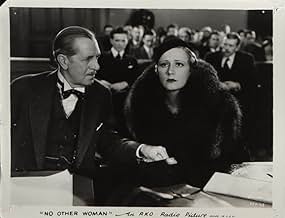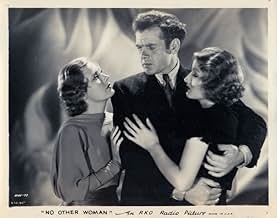Agrega una trama en tu idiomaA steelworker and his aspiring wife make millions when they become partners in a dyeworks. Unfortunately, success does not bring happiness.A steelworker and his aspiring wife make millions when they become partners in a dyeworks. Unfortunately, success does not bring happiness.A steelworker and his aspiring wife make millions when they become partners in a dyeworks. Unfortunately, success does not bring happiness.
- Dirección
- Guionistas
- Elenco
- Premios
- 1 premio ganado en total
Theodore von Eltz
- Sutherland
- (as Theodore Von Eltz)
Jules Cowles
- Boarder
- (sin créditos)
Phyllis Fraser
- Minor Role
- (sin créditos)
Arthur Hoyt
- Bridge Player
- (sin créditos)
Mary Mason
- Minor Role
- (sin créditos)
Opiniones destacadas
A group of people lives near the steel mills in a run-down neighborhood. Anna (Irene Dunne) and Jim (Charles Bickford) are in love with each other, but Anna longs for something better from life and Jim is content with the way things are. However, Anna is determined to change things, so she enlists Joe's (Eric Linden) help. Joe is an inventor with an excellent discovery; he makes Jim his manager and the two make a fortune. Unfortunately, Jim is out of town very often, and he gets lonely, so he becomes unfaithful with an exotic blonde (Gwili Andre). Soon Anna wonders if helping Jim was worth it after all.
This film is rather short, and I suspect that some of it is missing, but the story has continuity. It is a rather entertaining pre-code with a bitter courtroom battle at the end of the film. All of the actors are outstanding in their roles.
This film is rather short, and I suspect that some of it is missing, but the story has continuity. It is a rather entertaining pre-code with a bitter courtroom battle at the end of the film. All of the actors are outstanding in their roles.
No Other Woman is sure one misnomer of a title. This rather dated soap opera
has Charles Bickford caught between two of them.
First there's Irene Dunne, his wife who saw him through the lean years as he starts a new steel business with young chemist Eric Linden and bore his son Buster Miles. But Bickford never quite changed his partying ways and now that he's rich he carouses on a grander scale.
Enter Gwili Andre a slinky society minx who gets his mojo going and when Bickford's libido is aroused he's obeying what's coming from below decks.
Given the liberalization of divorce laws now, this film is quaintly old fashioned and a lot of younger viewers might not understand what's going on. But back in the day you had to prove allegations made in court and a lot of dirty linen got exposed. Then as now a lot of shaky allegations were made.
Irene Dunne is the noble wife who is ready to defend home and hearth from the intruder in court or anywhere else. A most typical role for her. The climax is the divorce case brought on by Bickford and his lawyer J. Carrol Naish. Naish really steals the film in the end as the kind of shyster that lawyer jokes are made out.
No Other Woman is dated and quaint, but still good entertainment.
First there's Irene Dunne, his wife who saw him through the lean years as he starts a new steel business with young chemist Eric Linden and bore his son Buster Miles. But Bickford never quite changed his partying ways and now that he's rich he carouses on a grander scale.
Enter Gwili Andre a slinky society minx who gets his mojo going and when Bickford's libido is aroused he's obeying what's coming from below decks.
Given the liberalization of divorce laws now, this film is quaintly old fashioned and a lot of younger viewers might not understand what's going on. But back in the day you had to prove allegations made in court and a lot of dirty linen got exposed. Then as now a lot of shaky allegations were made.
Irene Dunne is the noble wife who is ready to defend home and hearth from the intruder in court or anywhere else. A most typical role for her. The climax is the divorce case brought on by Bickford and his lawyer J. Carrol Naish. Naish really steals the film in the end as the kind of shyster that lawyer jokes are made out.
No Other Woman is dated and quaint, but still good entertainment.
I saw(?) this flick once before on the tube, but the reception on the station was so bad, I had to wait for it to come on again. It was a good wait, but it came around again. Irene Dunne and Charles Bickford were probably the only ones around who could'a pulled this one off. Bickford works at the mill, marries Dunne, works hard for the money, but somehow is just not satisfied with life. He's a lucky stiff though, as Irene Dunne-- as was wont of wives in those days--stuck with him through the thick and the thin of it. What is more incredulous is the rags to riches to rags aspect of this film. Bickford finances a new type of dye developed by the young upstart living in the family boarding house, and becomes a millionaire in the process. Yeah...right !! Still more incredulous--if not audacious--is the court scene where a very nasty divorce takes place, replete with witnesses who have been 'greased' to render perjured testimony...the whole nine yards. Bickford flies too close to the Sun with wings made of wax and...you can fairly well imagine the rest. It could'a worked, if the story had been a bit more developed, and if the film had been somewhat longer. This was essentially a character study which failed to study its characters with any depth.
No Other Woman (1933)
** 1/2 (out of 4)
A poor married couple (Irene Dunne, Charles Bickford) get rich after making a steel dye but then their marriage starts to fall apart due to him finding a mistress in New York. There's nothing overly special about this film but it runs a fast 58-minutes, which is almost a tad bit too much time. The story is very predictable right down to the showdown in court towards the end. The real reason to watch this is due to the performances of Dunne and Bickford. The two have a lot of chemistry together and make for a great couple. Bickford steals the show as the iron hard man who doesn't know what to do when he gets all that money. J. Carrol Naish has a small role. Previously filmed in 1918 and 1925.
** 1/2 (out of 4)
A poor married couple (Irene Dunne, Charles Bickford) get rich after making a steel dye but then their marriage starts to fall apart due to him finding a mistress in New York. There's nothing overly special about this film but it runs a fast 58-minutes, which is almost a tad bit too much time. The story is very predictable right down to the showdown in court towards the end. The real reason to watch this is due to the performances of Dunne and Bickford. The two have a lot of chemistry together and make for a great couple. Bickford steals the show as the iron hard man who doesn't know what to do when he gets all that money. J. Carrol Naish has a small role. Previously filmed in 1918 and 1925.
Irene Dunne was rarely paired with actors like Charles Bickford. Here he is a handsome, sweaty blue collar man who thinks -- but rarely with anything above his neck. Irene is kind of in love with him but also is loyal to the effete character played by Eric Linden.
Dunne and Bickford are an appealing couple but if ever a couple entered a marriage doomed to failure, it is the two they play.
He shows how dumb he is by throwing over the stylish, intelligent Dunne for Gwyli Andre -- a nobody in the story and in the history of film.
This is a standard women's picture in some ways. In others, it is a powerful drama. It doesn't seem dated and most assuredly warrants watching.
Dunne and Bickford are an appealing couple but if ever a couple entered a marriage doomed to failure, it is the two they play.
He shows how dumb he is by throwing over the stylish, intelligent Dunne for Gwyli Andre -- a nobody in the story and in the history of film.
This is a standard women's picture in some ways. In others, it is a powerful drama. It doesn't seem dated and most assuredly warrants watching.
¿Sabías que…?
- TriviaAt the wedding reception, guest are seen pinning money on Anna's dress before dancing with her. This was a common practice in Polish immigrant communities and was called the "money dance." Sometimes the bride wears an apron or carries a purse in which to place the money. The purpose of the money is for the couple's honeymoon, to set up housekeeping, or for the couple's first-born child.
- ErroresThe shadow of the camera can be seen falling on people at the wedding as it moves around the room.
- Citas
Anna Stanley: To your dying day, you'll work in the mill.
Jim Stanley: Sure! Why not?
Anna Stanley: Like your father did, and mine. And your children will go on doing the same thing, and their children...
Jim Stanley: Hey - what is all this tripe?
- ConexionesRemake of Just a Woman (1925)
Selecciones populares
Inicia sesión para calificar y agrega a la lista de videos para obtener recomendaciones personalizadas
Detalles
- Fecha de lanzamiento
- País de origen
- Idioma
- También se conoce como
- Just a Woman
- Locaciones de filmación
- Birmingham, Alabama, Estados Unidos(TCI Ensley Works - steel mill exteriors after wedding reception)
- Productora
- Ver más créditos de la compañía en IMDbPro
- Tiempo de ejecución
- 58min
- Color
- Relación de aspecto
- 1.37 : 1
Contribuir a esta página
Sugiere una edición o agrega el contenido que falta





































